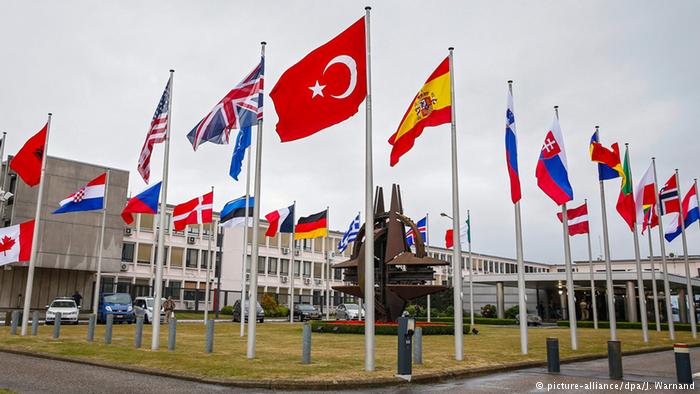
Turkey's Relations with and Relevance for NATO
 By Eugene Kogan, Tbilisi-based defence and security expert
By Eugene Kogan, Tbilisi-based defence and security expert
It should be remembered that Turkey’s relations with NATO were not as smooth as perhaps some experts wished to think, even before the failed coup on 15 July 2016. For instance, back in November 2009 the AKP government was adamant that despite Turkish soldiers’ participation in the ISAF mission they were not combat troops. Turkey's position at the time irked allies in NATO and the US in particular, and it has not changed since then. READ MORE
- EGF Editro |
Published on EGF: 24.06.2017
| Security
-
NATO and Turkey continue to need each other  By Benyamin Poghosyan, PhD, Executive Director, Political Science Association of Armenia
By Benyamin Poghosyan, PhD, Executive Director, Political Science Association of Armenia
In recent months, Turkey has been facing increasing difficulties with key NATO member states. The United States' growing reliance on Syrian Kurdish forces in Syria as a key force capable of effectively fighting Islamic State and US President Donald Trump's decision to arm Kurdish YPG units placed additional strains on bilateral US-Turkey relations, which have been sharply deteriorating since the July 2016 military coup and with Turkey's unsuccessful efforts to organize Fethullah Gulen's extradition from the US. READ MORE
- EGF Editor |
Published on EGF: 17.06.2017
| Security
-
Armenia Takes Leading Position in CSTO  By Benyamin Poghosyan, PhD, Executive Director, Political Science Association of Armenia
By Benyamin Poghosyan, PhD, Executive Director, Political Science Association of Armenia
An Armenian general is now at the helm of the CSTO military alliance. This may prove to be a double edged sword for Armenia.
The South Caucasus is one of the battlefields in the current Russia-West confrontation. As a part of the former Soviet space, the region is perceived by Russia as an area of its legitimate "special interests." For the West, including the United States, NATO and the EU, the view of the region is defined by its role as a key transit route for Caspian energy resources to reach Europe circumventing Russia, and as an important gateway to exert influence in the nearby Middle East. Regional geopolitical competition is further complicated by the onset of Iran and Turkey. READ MORE
- EGF Editor |
Published on EGF: 08.05.2017
| Security
-
EGF convenes high level expert seminar on Nagorno-Karabakh conflict resolution in Tbilisi
On 22 July 2015, EGF convened a further dialogue event between Armenian and Azerbaijani experts in its ongoing sequence on "What the South Caucasus Region Could Be: Exploring the Role of Economic Initiatives as Peace Building Tools in the Nagorno-Karabakh Context" in Tbilisi (Georgia). Similar to previous events of this nature held in 2014, the Tbilisi meeting unfolded in a constructive atmosphere and aimed to assess the role of economic initiatives in building peace in the Nagorno-Karabakh context. READ MORE
- EGF Editorial |
Published on EGF: 30.07.2015
| Security
-
Uzbekistan President Karimov’s long-term vision of a Central Asian Nuclear Weapons Free Zone is now much closer to realisation 
(206 Kb)
Snapshot analysis by Ben McPherson, Principal Editor, European Geopolitical Forum
In May 2014 an important initiative, the Central Asian Nuclear Weapon Free Zone, or CANWFZ, was enshrined by the actions of five nuclear states—the United States, the United Kingdom, France, China and Russia—as they signed a Protocol agreeing to respect the non-proliferation framework. The idea has been discussed since at least 1993, when the President of Uzbekistan, Islam Karimov, proposed it at the UN General Assembly. READ MORE
- Ben McPherson |
Published on EGF: 27.02.2015
| Security
-
Sailing the Unsettled South Caucasus through Troubled Waters towards Regional Integration 
(752 Kb)
 George Vlad Niculescu,
George Vlad Niculescu,
Head of Research, the European Geopolitical Forum
Just like other parts of Eurasia, the South Caucasus is facing the challenge of a renewed East-West geopolitical competition underpinned by three evolving challenges: 1) a growing ideological gap between Russia and the West; 2) the chronic persistence of protracted conflicts; 3) the dilemma of post-Soviet states: European vs. Eurasian integration.
More specifically, the South Caucasus geopolitical landscape is shaped by:
- the competition between Russia and the West in the wake of the ongoing Ukrainian crisis, which effectively brought the European cooperative security era to an end;
- growing Russian regional assertiveness, whereby the Eurasian Economic Union (EEU) is increasingly used as a vehicle for countering strides towards European integration, while OSCE-led conflict resolution is manipulated to create geopolitical leverage over the regional states;
- a tacit Russian-Turkish partnership of convenience, which is basically motivated by... READ MORE
- George Niculescu |
| Security
-
Brussels Seminar: Exploring the Role of Economic Initiatives as Peace Building Tools in the Nagorno-Karabakh Context
A highly successful roundtable discussion on Exploring the Role of Economic Initiatives as Peace Building Tools in the Nagorno-Karabakh Context took place on the 27th of March, 2014, at the European Parliament. The event was organized by the European Geopolitical Forum and international NGO partners, and was attended by more than 40 experts from the South Caucasus region and Brussels-based think tanks and international organizations who engaged in discussion in a constructive, informal ‘atmosphere of exchange’. The roundtable focused constructive energies on discussing a common future in an economically integrated South Caucasus, as a way to build mutual trust aimed at helping to overcome the current stalemate within the political and security negotiations. Please click here for the summary of conclusions of the event. READ MORE.
- EGF Editorial |
Published on EGF: 20.05.2014
| Security
-
Discussion of the second anniversary of the conflict in Syria In a recently hosted international panel by Voice of Russia America to discuss the second anniversary of the conflict in Syria, Mikhail Roschin, EGF Affiiated Expert on radical Islam in the North Caucasus and Central Asia speaks about the national uprisings that put Syria on the path to civil war and so far more than 70,000 people have been killed in the violence between rebel opposition groups and the regime of President Bashar al-Assad. To listen to this discussion, please click here.
- EGF Editorial |
Published on EGF: 03.04.2013
| Security
-
The "Global Swing States" thesis and the Future of the Black Sea Regional Order  By George Niculescu,
By George Niculescu,
Head of Research, The European Geopolitical Forum
In November 2012, the German Marshall Fund of the United States and the Center for a New American Security published a series of papers built upon the "global swing states" concept launched by Daniel Kliman and Richard Fontaine in a report on: "Global Swing States: Brazil, India, Indonesia, Turkey and the Future of International Order". READ MORE
- George Niculescu |
Published on EGF: 25.03.2013
| Security
-
Ukraine’s OSCE Chairmanship and the Transnistrian Conflict: A Breakthrough in the Making?  Paul Pryce
Paul Pryce
EGF Affiliated Expert on Conflict Management and the OSCE Institutions
Since the outbreak of initial hostilities in November 1990, the Transnistrian conflict persists. While numerous initiatives have been proposed over the past two decades both by external actors and by the parties to the conflict, the de jure Moldovan government and the de facto Transnistrian authorities, little progress has been made to secure a more lasting peace.
Click here to read more.
- Paul Pryce |
Published on EGF: 17.10.2012
| Security
-
